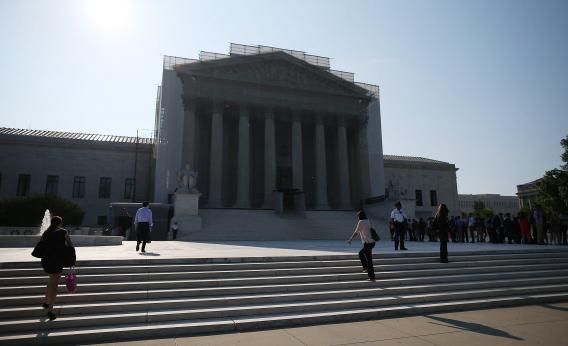When Edward Snowden recently revealed the National Security Agency’s phone surveillance programs, he set in motion a trans-Atlantic legal backlash.
On Monday, privacy groups in the United Kingdom and the United States launched lawsuits aimed at halting sweeping spy initiatives exposed last month by the 30-year-old former NSA contractor who leaked secret documents to the Guardian and the Washington Post.
The Washington-based Electronic Privacy Information Center announced that it is filing an emergency petition with the Supreme Court in a bid to end the NSA’s daily collection of millions of Americans’ call records. The civil liberties group alleges in a petition to the court released Monday that the secret Foreign Intelligence Surveillance Court “exceeded its statutory authority” when it signed off on an order authorizing the collection of millions of Verizon business customers’ phone records. EPIC argues that “it is simply not possible that every phone record in the possession of a telecommunications firm could be relevant to an authorized investigation.” It adds that the surveillance violates the First Amendment.
EPIC is filing the challenge directly with the Supreme Court because it says that the FISC will only hear petitions from the government or from companies in receipt of an order demanding they turn over data. In addition, lower federal courts, according to EPIC, have no jurisdiction to hear the appeal. In a 2012 case that reined in the government’s warrantless use of GPS trackers, the Supreme Court asserted that “awareness that the government may be watching chills associational and expressive freedoms.” A similar principle could be applicable in regard to the collection of millions of Americans’ phone records.
On the other side of the Atlantic, a separate legal challenge was lodged Monday in response to the government surveillance programs disclosed by Snowden. London-based Privacy International filed a complaint alleging that British spy agency GCHQ may be circumventing U.K. law by obtaining data on British citizens from the NSA’s PRISM Internet surveillance program. PRISM enables the NSA to collect data from companies including Google, Microsoft, Apple, and Facebook. The Guardian revealed last month that the NSA provides data collected by PRISM to GCHQ through a data-sharing agreement. Privacy International is also challenging the legality of a GCHQ spy program called Tempora, another spy effort exposed through Snowden’s leaks, that it alleges disproportionately gobbles up communications in violation of European human rights law. The group is seeking an injunction to block the surveillance. However, the challenge will be considered by a special secret Investigatory Powers Tribunal, which rarely rules against the government.
The number of lawsuits concerning the surveillance is likely to grow in the weeks ahead. Sen. Rand Paul, R-Ky., is leading an attempt to garner the support of millions of Americans for a large-scale class-action lawsuit over the surveillance. The American Civil Liberties Union has already filed a challenge in the Southern District of New York over the NSA’s surveillance of Verizon customers’ phone records. And another challenge over the NSA’s mass phone records grab alleging that the monitoring “violates the U.S. Constitution and also federal laws” has been filed in Washington, D.C.
